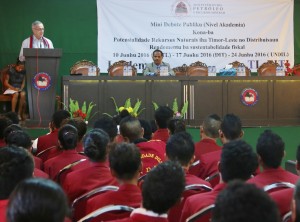Ministry of Petroleum and Mineral Resources organizes public debate for Higher Education

The Ministry of Petroleum and Mineral Resources, through the EITI Secretariat (English acronym for Extractive Industries Transparency Initiative, the international standard for natural resources management) organized a public debate at the Higher Education level, under the theme "The potential of natural resources in Timor-Leste and income distribution towards fiscal sustainability."
The official opening of the public debate was held on June 10th, 2016, at the National University of Timor-Leste (NUTL), went on to the Dili Institute of Technology (DIT) and, finally, to the University of Dili (UNDIL).
The purpose of this debate was to disseminate information on the mineral resources sector so that students can deepen their knowledge and answer questions about the Government's management of the natural resources in Timor-Leste, under the theme of transparency, accounting, and the adoption of the EITI global mechanism. In addition, students were able to learn about the use of oil and gas incomes on developing public infrastructures works, education and health, among others.
The Minister of Petroleum and Mineral Resources, Alfredo Pires, stated that Timor-Leste is a country that has been meeting EITI standards for over ten years, and is an example to the world: "EITI is a process that has been evolving for ten years. Before it only published the amounts that companies were paying us, assured that the money that Government received was correct, and then it made an annual report. The EITI process has developed and now not only publishes the amounts but also makes statements about things that are related to the Oil, Gas and Minerals Extractive Industry."
Alfredo Pires called on university students to take advantage of this debate, as they can get real information from the speakers of the National Petroleum and Mineral Authority, ConocoPhillips, the Ministry of Finance, the Central Bank of Timor-Leste (CBTL), the Ministry of Economic Affairs, the Ministry of Agriculture and Fisheries and also from civil society.
Took part in this debate university students, deans and teachers.










































